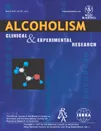 Accueil
Accueil
Détail de l'auteur
Auteur J. B. SAUNDERS |
Documents disponibles écrits par cet auteur (24)
 Ajouter le résultat dans votre panier Faire une suggestion Affiner la recherche
Ajouter le résultat dans votre panier Faire une suggestion Affiner la recherche
Article : Périodique
The Eleventh Revision of the International Classification of Diseases (ICD-11) was formally published in May 2019. Alcohol use disorders form a key part of the section of Disorders due to Substance Use and Addictive Behaviours. This review descr[...]
Périodique
J. R. M. CAPLEHORN ; IRWIG L. ; J. B. SAUNDERS | 1996FRANÇAIS : Deux échelles mesurant l'attitude vis-à-vis des traitements, attitude visant l'abstinence d'une part et l'usage illicite de stupéfiants de l'autre ont été développées à partir d'une étude effectuée auprès de 90 personnes travaillant [...]
Rapport
This manual introduces the AUDIT, the Alcohol Use Disorders Identification Test, and describes how to use it to identify persons with hazardous and harmful patterns of alcohol consumption. The AUDIT was developed by the World Health Organization[...]
Périodique
J. B. SAUNDERS ; FOULDS K. | 1992ENGLISH : Brief and early interventions represent an innovative strategy for the prevention of harm from alcohol and other drugs. The pioneering study of early intervention, undertaken by Kristenson et al. (1983) as part of a preventive medici[...]
Périodique
A. BAKER ; N. K. LEE ; M. CLAIRE ; T. J. LEWIN ; T. GRANT ; POHLMAN S. ; J. B. SAUNDERS ; F. KAY-LAMBKIN ; CONSTABLE P. ; L. JENNER ; V. J. CARR | 2005ENGLISH : Aims : The present study sought to replicate and extend a small pilot study conducted by Baker, Boggs & Lewin (2001) which demonstrated that brief interventions consisting of motivational interviewing and cognitive-behaviour therapy [...]
Périodique
D. J. KAVANAGH ; R. YOUNG ; A. WHITE ; J. B. SAUNDERS ; WALLIS J. ; SHOCKLEY N. ; L. JENNER ; A. CLAIR | 2004ENGLISH : Substance misuse is common in early psychosis, and impacts negatively on outcomes. Little is known about effective interventions for this population. We report a pilot study of brief intervention for substance misuse in early psychos[...]
Congrès
F. H. BURNS ; CROCKER C. ; J. B. SAUNDERS | 1993Des informations et des conseils sont donnés par téléphone 24 h/24 et 7 jours/7 par des spécialistes, des médecins spécialisés en toxicomanie et qui peuvent répondre immédiatement, faire un diagnostic, une prescription médicale et orienter le ma[...]
Périodique
J. R. M. CAPLEHORN ; J. B. SAUNDERS | 1993FRANÇAIS : A partir d'interviews de 101 héroïnomanes, il ressort que ces patients qui suivent une cure dans un service de désintoxication sont moins "enfoncés" dans la toxicomanie, alors que les toxicomanes lourds cherchent moins à se sevrer. [...]
Périodique
C. B. PULL ; J. B. SAUNDERS ; MAVREAS V. ; L. B. COTTLER ; B. F. GRANT ; D. S. HASIN ; J. BLAINE ; D. MAGER ; USTUN B. T. | 1997FRANÇAIS : L'étude a été menée dans 3 pays : Grèce, Luxembourg et Etats-Unis. Globalement, la concordance pour les critères de dépendance de l'ICD10 entre les trois instruments de mesure a été bonne ou correcte pour l'alcool, les opioïdes et la[...]
Périodique
M. D. SHANAHAN ; C. M. DORAN ; E. DIGIUSTO ; J. BELL ; N. LINTZERIS ; J. WHITE ; R. ALI ; J. B. SAUNDERS ; R. P. MATTICK ; S. GILMOUR | 2006ENGLISH : This economic evaluation was part of the Australian National Evaluation of Pharmacotherapies for Opioid Dependence (NEPOD) project. Data from four trials of heroin detoxification methods, involving 365 participants, were pooled to en[...]
Article : Périodique
The Alcohol Use Disorders Identification Test (AUDIT) has been developed from a six-country WHO collaborative project as a screening instrument for hazardous and harmful alcohol consumption. It is a 10-item questionnaire which covers the domains[...]
Article : Périodique
The high prevalence of alcohol consumption in the community suggests a need to adopt a population approach to reduce alcohol-related harm. Early intervention is a strategy which involves systematic screening of populations, followed by brief the[...]
Périodique
A. BAKER ; N. K. LEE ; M. CLAIRE ; T. J. LEWIN ; T. GRANT ; POHLMAN S. ; J. B. SAUNDERS ; F. KAY-LAMBKIN ; CONSTABLE P. ; L. JENNER ; V. J. CARR | 2004FRANÇAIS : Cette étude reprend les résultats dune enquête menée en 1998 à Newcastle, NSW, et les compare à ceux dune enquête transversale menée doctobre 2001 à septembre 2002 auprès de 214 usagers réguliers damphétamines. Les problèmes de santé[...]![Effectiveness of brief alcohol interventions in primary care populations [Review]](https://bdoc.ofdt.fr/img_cache/pmb_ofdt_record_80148.webp)
Article : Périodique
E. F. S. KANER ; F. R. BEYER ; C. MUIRHEAD ; F. CAMPBELL ; E. D. PIENAAR ; N. BERTHOLET ; J. B. DAEPPEN ; J. B. SAUNDERS ; B. BURNAND |What is the aim of this review? We aimed to find out whether brief interventions with doctors and nurses in general practices or emergency care can reduce heavy drinking. We assessed the findings from 69 trials that involved a total of 33,642 [...]
Périodique
A. M. ROCHE ; GURAY C. ; J. B. SAUNDERS | 1991FRANÇAIS : Des groupes cibles ont été utilisés pour déterminer quels étaient selon les médecins généralistes les principaux obstacles et causes de découragement dans la prise en charge effective de personnes présentant des problèmes de drogue o[...]




